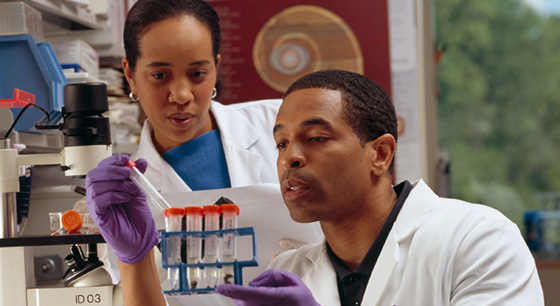Home / Research / Core Facilities /
 The Clinical Translational Core (CTC) functions as a service to IDDRC scientists to organize, integrate, and promote the use of translational research resources. Motivating our activities are core values related to diversity, equity, and inclusion in IDD science, and supporting early career fellows in joining and maintaining careers in IDD research.
The Clinical Translational Core (CTC) functions as a service to IDDRC scientists to organize, integrate, and promote the use of translational research resources. Motivating our activities are core values related to diversity, equity, and inclusion in IDD science, and supporting early career fellows in joining and maintaining careers in IDD research.
The CTC three major core components include:
- the Behavioral Evaluation Center, providing best-practice and next-generation infrastructure for quantification of behavioral phenotypes;
- Human Subjects Research Support services, facilitating end-to-end research coordination and conduct;
- a Translational Research Educational Program, aimed at bridging gaps in the translational research cycle through collaboration, dissemination, and education.
Core Services
Specific services are as follows:
The Behavioral Evaluation Center contains three services, the Behavioral Observation Laboratory, the Behavioral Assessment Consulting & Training Services, and the Innovative Phenotyping Consulting Service.
The Behavior Observation Laboratory is a state-of-the-art video recording laboratory centrally located on the 3rd floor in the IHDD Clinic Building. The BOL consists of a suite of recording four studios, observation rooms, a centralized server to support recording, storage, and data protection for video-based behavioral and phenotypic characterization. The studios can support table-top testing, interviews, and more flexible observations and interactions. The 3rd-floor BOL is also located adjacent to eye tracking and EEG recording facilities.
The Noldus VISO system is implemented in each studio, including a remote-control AXIS M5525-E PTZ robotic camera that allows for pan-tilt-zoom functions and a ceiling microphone. Software is available for post-recording annotation and coding. Incorporated into one of the studios is the Noldus Ethovision system, which parallels the animal movement tracking system available via the Animal Behavior Core. The core provides training, software, and hardware necessary for designing behavioral experiments, recording behavior, and behavioral coding. The Behavioral Evaluation Center will provide all technical support and maintenance of video recording and coding software and hardware.
The Behavioral Assessment Consulting & Training Service, provides a resource for IDDRC affiliates to receive consultation and training on assessments across multiple domains for behavioral phenotyping and outcome studies. Consultation expertise is available to provide support in selecting, administering, and developing reliability/validity metrics for standardized tools of cognitive, achievement, adaptive abilities, learning/memory, motor development, and mental health assessments, as well as gold-standard diagnostic assessments for autism and intellectual disability. Additional support is available for the use of the LENA system for language (digital) recordings and analysis. Facilitating relationships with the UCEDD clinics co-located at IHDD, such as the Autism Clinic, Biochemical Genetics Clinic, Cardiac Neurodevelopmental Clinic, Child Development Clinic, Down Syndrome specialty Clinic, Experimental Education Unit, Fetal Alcohol Spectrum Diagnostic & Prevention Network Clinic, Infant Development Follow-Up Clinic, Neurogenetics Clinic, Pediatric Audiology Clinic, Phenylketonuria Clinic, and UW Employment Program for individuals with developmental and other disabilities.
The Innovative Phenotyping Consulting Service, directed by Dr. Frederick Shic PhD, provides a resource for IDDRC affiliates to receive consultation and training on innovative methodologies that includes language digital recordings (LENA), eye tracking, motion tracking, human-robotics interfaces, and video games. Critical to our current environment, this also includes considerations of how to modify or pivot standard behavioral assessments to telemedicine or remote acquisition as well as new methods being developed that were designed for remote assessment. In addition, we support the Data Integration Workgroup, which focuses on developing infrastructural, technical, and conceptual solutions to challenges in the integration of complex, multimodal, multi-institutional data.
Human Subjects Research Support, directed by Ariana Kaci MA, is designed to assist Research Affiliates to obtain access to specialized expertise in state-of-the-art tools for human subjects research.
We have identified specific service providers available through the Institute of Translational Health Sciences (ITHS) and other institutional and regional resources, including those within our IDDRC, best suited to support the research being performed by our affiliates. Ariana Kaci (arianah@uw.edu), our IDDRC Research Navigator, provides individual investigators with facilitated access to these resources, organizes informational workshops and seminars for groups engaged in human subject research, and assists in ensuring that budgeting for services is accurate. Services provided include:
- Applications to and Interactions with the Institutional Review Board
- Regulatory Review
- Study Subject Recruitment and Retention
- Community Outreach
- Research Coordination
- Biomedical Informatics and Electronic Health Records Data Mining
- Clinical Database Development and Management
Translational Research Education Program (TREP), directed by Ghayda Mirzaa, M.D., supports the exploration of the translational potential of basic science findings to inform and improve clinical outcomes for those with intellectual and developmental disabilities. The TREP facilitates efficient and effective translational efforts by capitalizing on our collective expertise in this area. This program builds on previously and currently supported research grants that have identified several genetic pathogenetic variants associated with IDD and ASD. Activities include the Biological Basis of Autism Collaborative Research Area which hosts symposiums on genetic variants or genetic pathways associated with ASD and ID. We will also expand to develop targeted educational events and working groups that bring together geneticists, animal and cell model experts, basic scientists, clinicians, family stakeholders, and industry partners.
Additional translational research development can be accessed through the ITHS preclinical consulting services.
We welcome ideas for expanding translational knowledge and can partner to host events in your target area.
Clinical Translational Core Meetings (Video)
The Neurodevelopmental Disorders Research Consortium (NDRC) is a collaborative research effort between the UW IHDD and Center for Integrative Brain Research (CIBR) at the Seattle Children’s Research Institute, which is dedicated to studying and gaining insights into various neurodevelopmental disorders. Please check out the previous recorded meetings below.
Visualizing IDD/NDD Data (December 12, 2024)
Previous CTC/NDRC Videos
Video summary: Integrating Special Populations (ISP) website; ISP consultation request form.
ITHS Integrating Special Populations, is a program focused on increasing engagement, enrollment, and retention of children, youth, and older adults, particularly from racially/ethnically and economically diverse populations, in research. At this event with ISP, you will:
- Explore barriers to research participation for individuals of minority race or ethnicity, participants who prefer a language other than English, and those in low-resource communities.
- Learn strategies to increase research participant diversity in terms of participant race, ethnicity, language, and socioeconomic status.
- Learn how to effectively partner with community organizations and community entities for successful academic-community research collaborations.
Video summary: This session covers the ITHS Biomedical Informatics (BMI) resources and services. The focus is on leveraging the Electronic Medical Records (EMR) with ITHS data services for cohort discovery and recruitment.
CTC Intake and Requests
To help us facilitate core use and allocation of resources, we use an intake process for services. Information requested will include information about the grant or program of research to be supported, relevance to intellectual and developmental disability, and the core services to be accessed. To request services, contact sjwebb@uw.edu
CTC list services
To get updates on our core services and activities, contact us to be added to our research coordinator list at arianah@uw.edu
Clinical Translational Core
Ariana Kaci, MA
Research Navigator
Email: arianah@uw.edu

